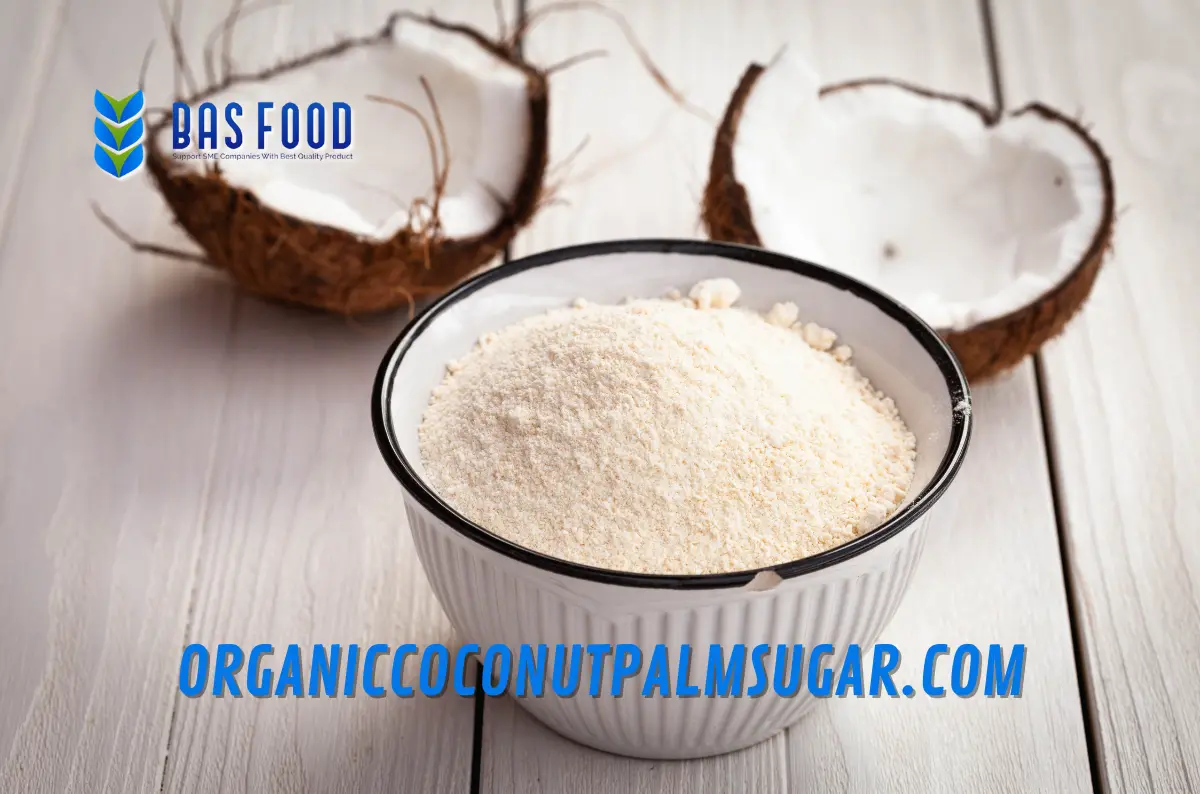In today’s global food industry, coconut flour has become a star ingredient for health-conscious consumers and food manufacturers. But before purchasing tons of it for your product line, getting a coconut flour sample is a smart move. This simple step lets you test its texture, aroma, and performance in real recipes before committing to a large order.
Whether you run a bakery, a gluten-free snack company, or a beverage brand experimenting with coconut-based ingredients, a sample trial helps reduce risk and ensures consistent product quality. In this article, we’ll explore how to request a trial, evaluate its characteristics, and connect with reliable suppliers like CV Bonafide Anugerah Sentosa, a leading coconut and spices supplier from Indonesia.

What Exactly Is a Coconut Flour Sample?
A coconut flour sample is a small, pre-packaged amount of coconut flour provided by a supplier for testing purposes. It’s usually sent to potential buyers who want to check the product’s quality before placing a bulk order. Samples typically range from 250 grams to 1 kilogram—enough to conduct baking trials, moisture tests, and sensory evaluations.
Suppliers offer these samples to showcase their product’s quality standards, processing methods, and consistency. For businesses, it’s an effective way to verify claims like “gluten-free,” “organic,” or “low-fat.” In essence, a trial coconut flour gives both buyer and supplier a chance to build trust through transparency.
Why You Should Request a Trial Coconut Flour Before Bulk Purchase
Ordering a trial coconut flour sample before making a bulk purchase isn’t just about curiosity—it’s about protecting your investment. Coconut flour varies widely in texture, color, oil content, and taste depending on how it’s processed and sourced.
For example, some coconut flour might be finely milled with a mild aroma, perfect for pastries and beverages, while others may be coarse and better suited for energy bars or coatings. Without testing, you might end up with a batch that doesn’t suit your production needs.
By running tests on a coconut flour sample, you can:
- Observe how it behaves in baking or blending.
- Measure moisture content and fiber levels.
- Compare aroma, color, and granulation with other suppliers.
- Evaluate its solubility and consistency in recipes.
In short, requesting a sample ensures your product maintains quality and flavor consistency.
How to Request a Free Coconut Flour Sample from Suppliers
Getting a free sample request from a coconut supplier is straightforward if you know what to ask for. Most reliable suppliers, especially exporters, provide samples upon inquiry—sometimes at no cost, sometimes with a minimal shipping fee.
To make a strong impression, be clear in your request. Specify details such as:
- The quantity of coconut flour sample you need (e.g., 500 grams).
- The intended use (e.g., bakery trial, lab testing, or R&D).
- Your company name, address, and contact information.
- Any certification preferences (e.g., organic, non-GMO, halal).
Suppliers appreciate buyers who communicate clearly and professionally. When you send a free sample request, also ask for the product specifications sheet, test report, and photos of their factory. This gives you a complete picture of what to expect before the sample even arrives.
How to Test Coconut Flour Quality Like a Pro
Once you receive your coconut flour sample, the next step is to test coconut flour quality. This process helps you determine if it meets your business standards and end-product requirements. Here’s how to evaluate it effectively:
1. Visual and Sensory Check
Start with your senses. Observe the color—premium coconut flour should be creamy white or light beige, not grayish. Smell the sample; it should have a pleasant, mild coconut aroma without rancid or burnt notes. Touch it; it should feel dry and soft, not clumpy or oily.
2. Moisture and Texture Test
You can do a simple moisture test by pressing the flour between your fingers. High-quality coconut flour is fine and slightly fluffy. Too much moisture can affect shelf life and product stability.
3. Baking and Mixing Trial
Try incorporating the trial coconut flour into your recipes. Notice how it absorbs water or oil—coconut flour tends to absorb more liquid than wheat flour. Evaluate the texture of the finished product. Does it turn out soft, dense, or crumbly? This real-world test tells you whether the sample fits your production requirements.
4. Lab Analysis (Optional)
For export-oriented manufacturers, it’s wise to conduct lab tests. Check for microbiological safety, fat content, and dietary fiber. This ensures the flour aligns with your target market’s food safety regulations.
By following these simple steps, you’ll have a clear picture of the coconut flour sample quality before proceeding with large orders.
Why Indonesian Coconut Flour Is Trusted Worldwide
Indonesia is one of the world’s top coconut producers, supplying high-quality coconut products like flour, oil, and cream to global markets. The country’s tropical climate and abundant coconut plantations make it an ideal source for sustainable, premium-grade ingredients.
Most Indonesian producers, including CV Bonafide Anugerah Sentosa, source coconuts from trusted farmers and process them using hygienic, export-standard facilities. Their coconut flour is produced from fresh, defatted coconut meat and dried under controlled conditions to preserve natural aroma and nutrients.
When you request a coconut flour sample from an Indonesian supplier, you’re not just testing a product—you’re experiencing decades of craftsmanship and agricultural expertise. The flour often meets international standards like USDA Organic, EU Organic, and Halal certification, making it suitable for diverse global markets.
Introducing CV Bonafide Anugerah Sentosa – Your Trusted Coconut Supplier
Among Indonesia’s many suppliers, CV Bonafide Anugerah Sentosa stands out as a trusted exporter of coconut products and spices. Based in Yogyakarta, this company supplies coconut flour, coconut sugar, and coconut water concentrate, alongside export-quality spices like cloves, nutmeg, and vanilla beans.
The company emphasizes consistency, hygiene, and traceability. Every coconut flour sample provided by CV Bonafide Anugerah Sentosa represents the same quality as their bulk export products. This ensures that once you approve the trial, you can expect identical results in production.
Their production process combines traditional expertise with modern technology, ensuring the flour retains its natural nutrients while meeting strict food safety standards. Buyers worldwide value their reliability, clear communication, and commitment to delivering the best of Indonesia’s natural resources.
Benefits of Sampling Before Purchase for Businesses
Requesting a trial coconut flour sample before confirming an order benefits businesses in several ways. It minimizes risk, supports better quality control, and builds supplier confidence. For startups, it also provides a chance to experiment with formulations without large financial commitments.
Testing allows you to fine-tune recipes, adjust ratios, and evaluate how coconut flour interacts with other ingredients. This small step can save you from costly reformulations later. Moreover, suppliers appreciate clients who take time to evaluate samples—it shows you value quality and partnership.
Whether you’re launching a new gluten-free snack line or expanding your bakery menu, a coconut flour sample gives you the insight needed to make the right purchasing decision.
How to Turn a Sample into a Long-Term Partnership
Once you’re satisfied with the test coconut flour quality, maintaining open communication with your supplier is key. Provide feedback—what you liked, what could improve, and your target production timeline. This feedback loop helps suppliers adjust their offerings and ensures consistent quality in future shipments.
Building a partnership with reliable suppliers like CV Bonafide Anugerah Sentosa also opens doors to other coconut-based products. Many buyers who start with a simple coconut flour sample often continue purchasing coconut sugar, coconut cream, or desiccated coconut from the same supplier because of trust and proven quality.
Conclusion: From Sample to Supply Chain Confidence
Getting a coconut flour sample isn’t just about testing a product—it’s about starting a reliable partnership. By taking the time to request a trial coconut flour, evaluate its texture, and test coconut flour quality, you ensure your final products meet both market expectations and your brand’s promise of excellence.
Indonesia, with its vast coconut resources and skilled producers, remains a top choice for sourcing. And when working with a reputable supplier like CV Bonafide Anugerah Sentosa, you gain not only quality products but also a trustworthy partner dedicated to your business growth.
So before placing your next bulk order, start small—request a sample, test it well, and let quality guide your decision.
Contact CV Bonafide Anugerah Sentosa how we can provide the best solutions for you. WhatsApp: +62 8213 4505 737, Email: info@bonafideanugerahsentosa.com / bas.mdir@gmail.com.

